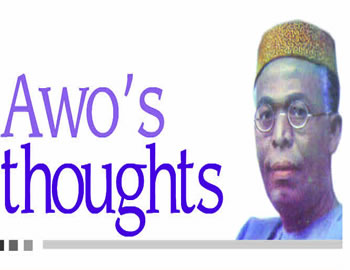VARIOUS methods have been devised for the practice of representative democracy. In some countries, it is permissible for the representatives to be elected by a relative rather than an absolute majority of votes; in some others the constitution prescribes that the representatives must have an absolute majority of votes; and in yet some other countries, the method adopted is such as to ensure that the representatives consist of practically all the shades of political opinion in the state. Again, in some countries the legislative representatives on the one hand, and the executive representatives on the other, are separately elected by and responsible to the people; but in others it is only the legislative representatives that are elected by and responsible to the people, whilst the members of the executive are chosen from among, and responsible to, the legislative representatives.
I have left killers of my four undergraduate children to God’s judgement —ABU lecturer
It is clear from the foregoing that in order that the persons elected by what method soever, may be regarded as the accredited representatives of the adult members of the state, the electors must be allowed to exercise their right of choice without let or hindrance.
They should not be intimidated coerced into making an unwanted choice; and they should be allowed to make their choice in secret so as not to be subjected to any fear in casting their votes, and not to be exposed to hatred and hostility from those who have not been favoured by their votes.
In devising its method of representative democracy, every state should bear certain postulates in mind.
1) ‘Every person has the right to freedom and to the unfolding of his personality.’
2) Every person has the right to hold, express, and canvass any opinion he likes.
3) All persons are equal in the eye of the law, and are therefore entitled to equality in the enjoyment of the rights of personal liberty, of association, and of free movement.
4) Every adult person is entitled to have a say in the manner in which the affairs of his country are being or should be conducted.
The rationale for these postulates can be demonstrated. But there is neither time nor space to do so here.
Nevertheless, I would like to stress that the acceptance and observance of these postulates automatically rule out the legitimacy of the so-called one-party system. Because of heredity, upbringing and other factors, there are scarcely two men, in any community, exactly: alike in their thinking, opinions, and affections. It is, therefore, all that the people in a state can do to form themselves into different political associations or parties each of which in Burke’s words is: ‘united for promoting by their joint endeavours the national interest upon some particular principle upon which they are agreed’.
In other words, one of the quintessences of democracy is a multi- party system. It is under such a system that the individuals are able to exercise their right of association, their right to the unfolding of their peculiar personalities, and their right to hold, express, and canvass any opinions they like
It must be proclaimed from the house-tops, therefore, for all to hear, that democracy and the one-party system are absolutely antithetic. This is so, because under the one-party system, the citizens arc compelled, by a process of coercive regimentation of thoughts and opinions, to belong to one political association. In the alternative, they are coerced to refrain either from holding any political opinions at all, or from expressing and canvassing any such opinions.
Those who are engaged in constitution-making, in any country, should be reminded that one of the lessons, which political history has tirelessly inculcated, is that any form of government other than democracy is doomed to failure and disaster, and can only be sustained, in the short time, by fraud, intimidation, and force.
CLOSING REMARKS:
‘Science’, it is truly said, ‘demands general laws by the aid of which we can reach exact results.’
Here in Nigeria, as in most of the developing countries, we are now busy making an earnest search for a suitable constitution. In order that our search may be fruitful, those of us who ate taking part in it will do well to divest ourselves of irrational emotions, personal self-interests, and sectional prejudices and affections.
Positively, we would be wise, and our efforts would be blessed, if; in the course of this momentous search, we adopt, most strictly, a scientific approach such as I have outlined and advocated in this lecture, and follow faithfully the principles which I have enunciated.
For, it is only by so doing that we can reach exact results. Indeed, it is only by so doing that we can fashion a constitution which will, assuredly, prove satisfactory to our people, both in the short and long term, and make our country a living practical exemplar for other developing countries in search of suitable constitution.






